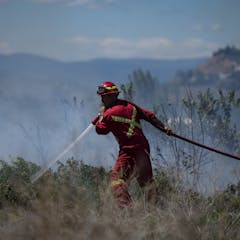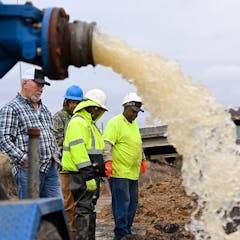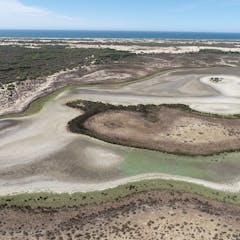
Articles sur Water security
Affichage de 1 à 20 de 99 articles

A leading driver of this seaweed invasion is pollution, carried down rivers and into the Atlantic Ocean from the continents.

Water is everywhere, but freshwater supplies are limited on many Caribbean islands. Rising demand and climate change are worsening water shortages for the people who live here.

In the lead-up to the 2024 federal budget, there was hope for investments in water management and water-related infrastructure. Those hopes were misplaced.

Filtering out PFAS is only the first step. These ‘forever chemicals’ still have to be destroyed, and there are many questions about how to do that safely.

Extreme downpours and droughts, both fueled by rising global temperatures, are taking a toll. Communities trying to manage the threats face three big challenges.

The big question: Would climate engineering like sending reflective particles into the stratosphere or brightening clouds help reduce the national security risks of climate change or make them worse?

These giant rivers in the sky are both destructive and essential for the Western U.S. water supply.

Achieving continuous supply requires both a realistic assessment of the situation and a realistic plan to meet the goal. The Government of India’s new initiatives have neither.

Water shortages are one of the greatest problems created by a warming world. A decentralized water system is a compelling counterargument to the notion that bigger is better.

Halfway to the SDGs’ 2030 deadline, countries have made progress, but most are struggling to meet all 17 goals. The US is no exception.

A webinar hosted by The Conversation brings together experts in law, health, policy and Indigenous affairs to explain some of the most pressing problems related to water in the US.

PFAS can be filtered, but getting rid of the chemicals is a monumental challenge. A biochemist and soil scientist explain.

Fires here can affect meltwater timing and water quality, worsen erosion that triggers mudslides, and much more, as two scientists explain.

Climate change and related droughts, hurricanes, floods and other extreme weather events are making it harder.

Transboundary water cooperation can reduce conflict and promote sustainable development.

The first UN conference dedicated to water in nearly half a century is being held in New York.

Australia’s emerging green hydrogen industry requires a secure supply of high-quality water. Competing demands for this scarce resource mean careful planning is needed to meet all water users’ needs.

While we know how global changes in freshwater pose risks to humans and ecosystems, we know less about how people and ecosystems will respond to these global freshwater challenges.

As water dripped in a remote cave, it left behind evidence of every monsoon season for a millennium. Scientists say it holds a warning for a country about to become the most populous on Earth.

Most of the flooded communities are Indigenous and rely on subsistence hunting that residents would normally be doing right now. Recovering from the damage will make that harder.
